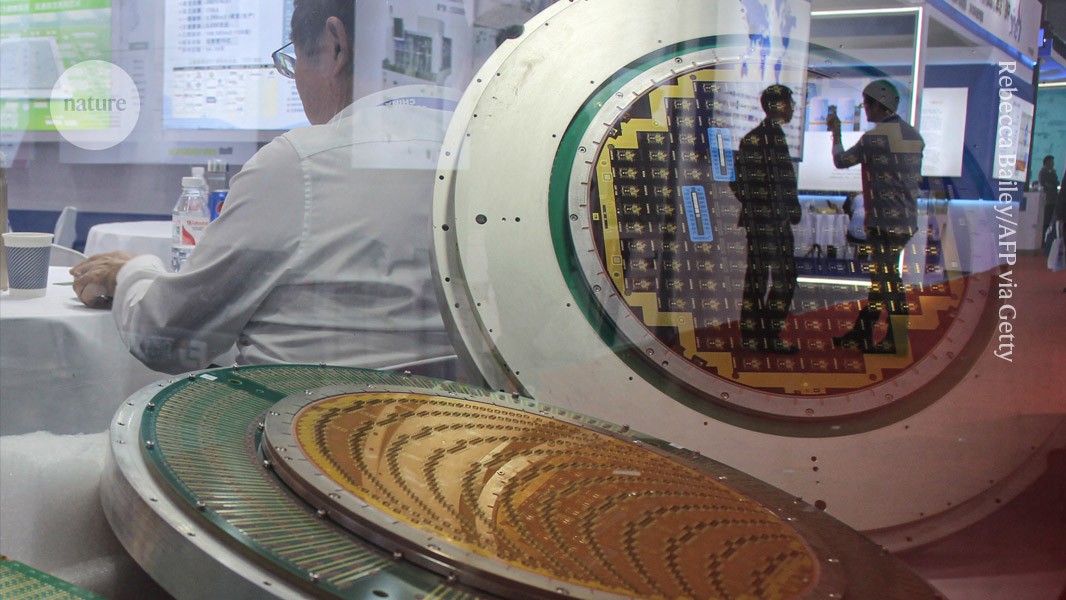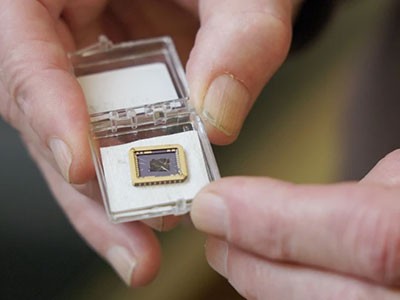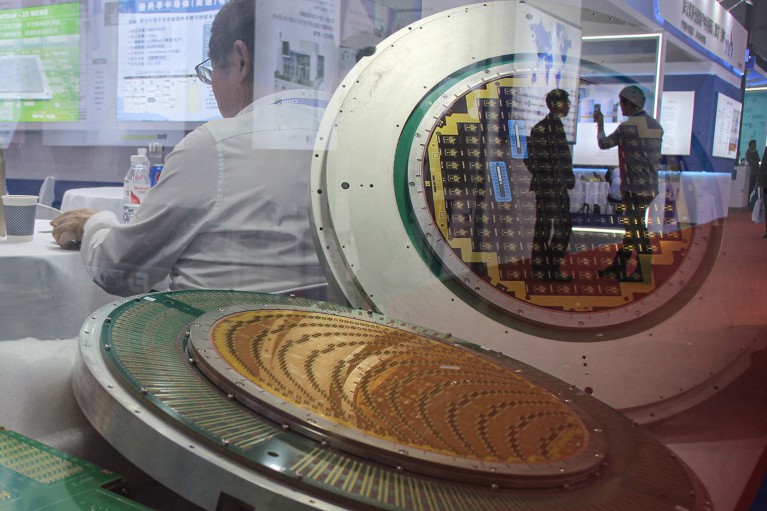
Geopolitical tensions are affecting international collaborations in key areas of research, including the semiconductor sector.Credit: Rebecca Bailey/AFP via Getty
Data indicate that geopolitical tensions are affecting how scientists around the world collaborate on research projects. But “rather than uniformly shrinking, global academic networks are being reconfigured”, says Marina Zhang, a technology and geopolitics researcher at the University of Technology Sydney, in Australia. Collaborations with Israel and Russia, and between China and the United States, are among those seeing such shifts.
Scientific collaborations between Israeli researchers and academics in other countries have declined this year, following the war in Gaza, which began in October 2023 after Hamas attacks on Israel. The analysis, by Science|Business, a network of universities, companies and research and policy organizations, looked at patterns of co-authorship in preprints indexed in the Scopus database.
Countries whose governments have been particularly critical of the Gaza war showed the biggest drops in collaborations with Israel. The percentage of all Israeli preprints that were co-authored with scientists in Spain fell from 9.2% in 2024 to 5.9% this year. Similarly, the proportion of Israeli preprints with South African co-authors declined from 3.4% in 2024 to just 1% this year (see ‘Research collaborations with Israel’).
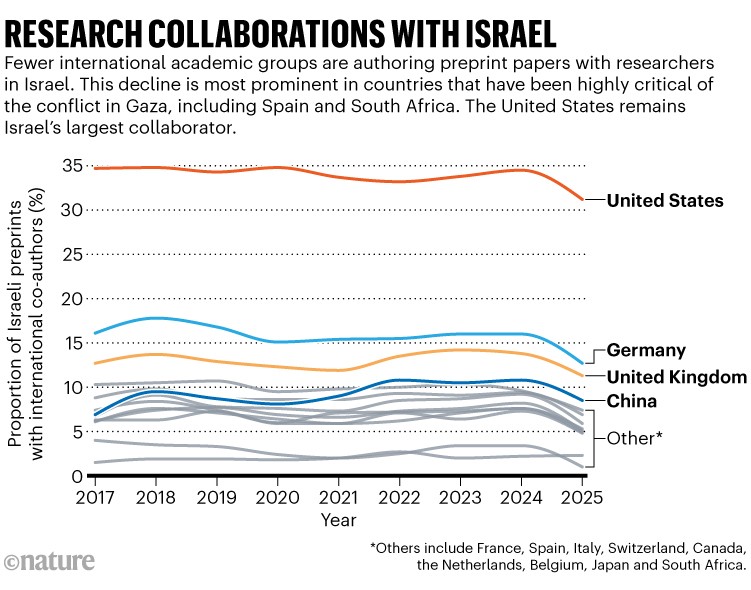
Source: sciencebusiness.net
Some researchers who spoke to Nature say the data are an early indication that individual academics are boycotting Israeli science because of the war in Gaza. “This is a way of putting pressure on Israel,” says Giacomo Ortona, a nuclear physicist at Italy’s National Institute for Nuclear Physics in Turin. In September, Ortona was involved in a petition calling on CERN — Europe’s particle-physics laboratory near Geneva, Switzerland — to suspend cooperation with Israel.
David Lehrer, director of the Centre for Applied Environmental Diplomacy at the Arava Institute, in Ketura, Israel, says the boycotts are having an impact on Israeli science. “We have recently encountered European countries such as Spain whose research institutes refuse to work with any Israeli research institute in applying for EU grants,” says Lehrer.
But Anat Paz, spokesperson for The Association of University Heads in Israel (VERA) says the data do not provide a full picture and that it is “too early to draw a conclusion” regarding the trend of collaborations involving Israeli universities. “We will have a much clearer picture once the complete data for 2025 has been compiled and reviewed early next year,” Paz adds.
Top tips for building and maintaining international collaborations
In May 2024, VERA published a press release in response to a statement made by the Conference of Rectors of Spanish Universities (CRUE) expressing regret about the situation in Gaza, saying the association wishes to correct misunderstanding which “presupposes the possibility that Israeli academic institutions are not dedicated to peace and to international humanitarian law. [We] too mourn the loss of innocent life in this horrific conflict and want a better future for Palestinians and Israelis both. However, academic boycotts are dangerous and may very well cause more harm than good,” they wrote in the press release.
Russian collaborations
Indications of drop in collaborations between Israel and international research partners is part of a broader geopolitical story. A similar decline in global collaboration was seen with Russia following the full-scale invasion of Ukraine in 2022.
Unlike individual scientists boycotting Israeli research, the decline in partnerships with Russia involves top-down policy statements from governments, most notably in the US, “to reduce or eliminate scientific work with Russia,” says Caroline Wagner, a science policy researcher at Ohio State University in Columbus.
An analysis by Nature in 2023 found research collaborations between Russia and Western institutions had dropped a year into its war on Ukraine. Some funders of these institutions and the Ukrainian government discouraged the co-authoring of papers with Russian researchers. This decline was not seen for China and India, whose collaborations with Russia increased the same year.
A separate analysis published in August this year by VoxUkraine, an independent analytical platform based in Kyiv, found that global publications with Russian co-authors dropped by 26% between 2021 and 2024. These papers were also cited less — with an 89% drop in the number of citations these papers received in 2024 compared to 2021 (see ‘Sharp fall in citations with Russian papers).
These “formal restrictions” have changed research collaborations with Russia. “Sanctions, funding cuts, brain drain, and tighter state control have deepened the decline since 2022”, says Zhang.
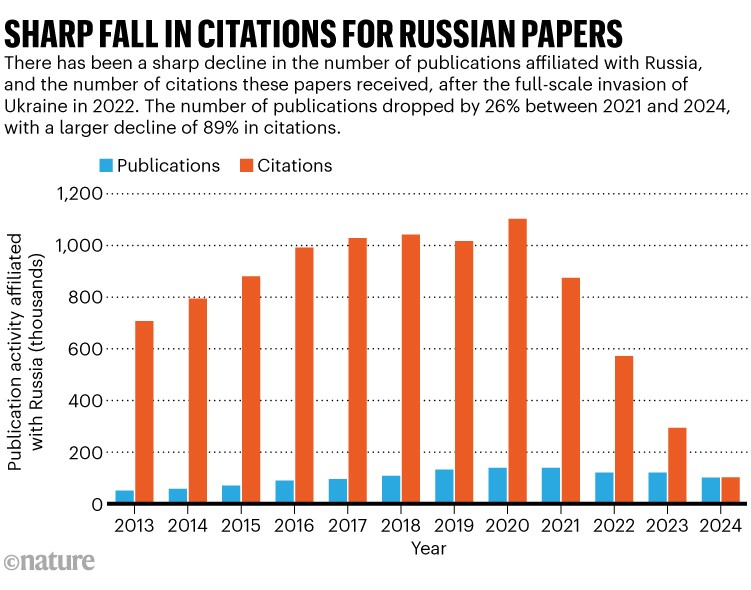
Source: voxUkraine.org
US-China collaborations
Declining rates of collaborations with individual countries like Russia and Israel are part of a wide-ranging reconfiguration of global academic networks, says Zhang.
Political tensions between the China and the US have also affected collaborations between the two countries. China still remains the top partner of the US, and Chinese scientists are increasingly lead joint projects with the UK, US and Europe, but the number of Chinese research papers with American co-authors dropped by 6.4% between 2017 and 2023.
China–US research collaborations are in decline — this is bad news for everyone


